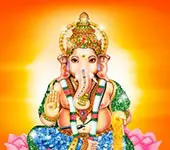Comments
Read more comments
Knowledge Bank
History of Lanka
The old history of Lanka begins with Heti, a Rakshasa born from Brahma’s anger. He had a son, Vidyutkesa. Vidyutkesa married Salakatanka, and their son Sukesha was abandoned in a valley. Shiva and Parvati blessed him and guided him to a righteous path. Sukesha married Devavati, and they had three sons: Malyavan, Sumali, and Mali. Blessed by Shiva, the three gained power through penance and received a boon from Brahma to conquer the three worlds. They built the city of Lanka on Mount Trikuta and started harassing people instead of following their father’s path. Maya, an architect, built the city. When the Rakshasas troubled the Devas, they sought help from Shiva, who directed them to Vishnu. Vishnu killed Mali and every day he would send Sudarshana Chakra to Lanka and kill groups of Rakshasas. Lanka became unsafe for Rakshasas and they fled to Pathala. Later, Kubera settled in Lanka and became its ruler. Along with Heti, a Yaksha was also born. His descendents moved to Lanka and settled there. They were righteous and when Kubera came to Lanka, accepted him as their leader.
What is Sanatana Dharma?
Sanatana Dharma is a way of living based on eternal laws. It guides people to live righteously in every aspect of life. These laws are gathered from all available knowledge, both physical and spiritual, and are rooted in the ultimate source of all power and life. This system unites all beings, from humans to subhuman and superhuman creatures, in a harmonious society. It helps every individual grow, find happiness, and avoid pain in this life and the next. Through Sanatana Dharma, people achieve worldly success and the ultimate spiritual goal of Moksha, which brings supreme bliss. In simple terms, Sanatana Dharma is a way of right living, using the best wisdom available to guide every part of life.
Recommended for you
Death is a New Beginning

Shiva Kavacham for Protection

ॐ नमो भगवते सदाशिवाय सकलतत्त्वात्मकाय सकलतत्त्वविहारा�....
Click here to know more..Vighnaraja Stuti

stotraraajamenasopamuktashuddhachetasah'. eepsitaarthamri'ddhisiddhimantrasiddhabhaashitaah' praapnuvanti te ganeshapaadapadmabhaavitaah'.....
Click here to know more..